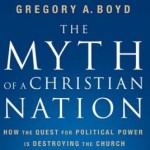We run our website the way we wished the whole internet worked: we provide high quality original content with no ads. We are funded solely by your direct support. Please consider supporting this project.

The Politics of Jesus, Part 2
Even in the midst of politically-troubled times, we are called to preserve the radical uniqueness of the kingdom. This, after all, is what Jesus did as he engaged the first century world with a different kind of politics (see post). To appreciate the importance of preserving this distinction, we need to understand that the Jewish world Jesus was born into was a political hotbed. There was constant political and cultural friction between the ruling Romans and their Jewish subjects. And almost all Jews despised the fact that they, “the true people of God,” were tyrannically ruled by immoral pagans. Most Jews longed for a political messiah, like King David, who would restore Israel to its glory through military force.
At the same time, first-century Jews were deeply divided over how to respond to the political situation. On one extreme were the zealots who believed that Jews should take up arms against the Romans, trusting that God would intervene on their behalf. On the other extreme were the “conservatives” who thought it best not to trouble the waters but rather to cooperate with the Romans as much as possible. In between, people took all kinds of different positions on various political questions.
Should Jews obey Roman laws, and if so, which ones? Should they pay taxes to Caesar? Should they fight in the Roman army? Should they pay homage to statues of Roman emperors? Should they be educated in the Roman way? Should they participate in Roman national festivities? The list of politically-related questions was almost endless.
When Jesus came on the scene, many tried to get him to weigh in on these issues. They were expecting a political messiah who would answer their questions, solve their problems, and liberate them from Roman rule. But Jesus didn’t do any of this.
Jesus didn’t come to give us the Christian answer to the world’s many sociopolitical quandaries, and he didn’t come to usher in a new and improved version of the kingdom of this world. His agenda was far more radical. He came to usher in an alternative kingdom. He came not to give solutions, tweak external regulations, and enforce better behavior. He rather came to transform lives from the inside out by winning people over to the reign of God’s sovereign love.
Jesus’ mission wasn’t to improve the old; his mission, and the mission he gave his disciples, was to embody the new—an entirely new way of doing life. It is life lived within the reign of God; life centered on God as the sole source of one’s security, worth, and significance; life lived free from self-protective fear; and life manifested in Calvary-like service to others. His promise is that as his disciples manifest the unique beauty and power of this life, it will slowly and inconspicuously—like a mustard seed—grow and take over the garden.
—Adapted from The Myth of a Christian Nation, pages 57-60
Photo via Visualhunt
Category: General
Tags: Jesus, Kingdom Living, Kingdom of God, Politics
Topics: Ethical, Cultural and Political Issues
Related Reading

The Rule of Love
The traditional confession that Scriptura sacra sui ipsius interpres (“Sacred Scripture is its own interpreter”) presupposes that there is one divine mind behind Scripture, for example. Moreover, Church scholars have traditionally assumed that Scripture’s unity can be discerned in a variety of concepts, motifs, themes and theologies that weave Scripture together. And to speak specifically of the…

What Kind of God Did Jesus Reveal?
The ReKnew Manifesto exists to encourage believers and skeptics alike to re-think things they thought they already knew – hence our name, Re-Knew. I am currently working through the theology of the Manifesto in a series of posts that began a couple of months ago. Over the last few posts, we have been looking at the…

“The kingdom of God…advances only by exercising power under others. It expands by manifesting the power of self-sacrificial, Calvary-like love.” [Quotes]
“While all the versions of the kingdom of the world acquire and exercise power over others, the kingdom of God, incarnated and modeled in the person of Jesus Christ, advances only by exercising power under others. It expands by manifesting the power of self-sacrificial, Calvary-like love.”

Classical Theism’s Unnecessary Paradoxes
The traditional view of God that is embraced by most—what is called “classical theology”—works from the assumption that God’s essential divine nature is atemporal, immutable, and impassible. The Church Fathers fought to articulate and defend the absolute distinction between the Creator and creation and they did this—in a variety of ways—by defining God’s eternal nature…

Does the Doctrine of the Trinity Matter?
Jesus reveals the greatest, most beautiful, and mysterious aspect of God when he, despite being himself God Incarnate, relates to God as his “Father” and refers to God as “the Holy Spirit.” There is, of course, only one God (1 Cor 8:6). Yet Jesus reveals that God somehow exists as Father, Son and Holy Spirit.…

God Became a Zygote
Has the Christmas story become so familiar that you’ve lost any sense of how spectacular it is? The great creator of the universe became a microscopic zygote. The all-powerful being who spoke the stars into existence came in a very small and vulnerable way. He crossed an infinite distance to become one of us. You can watch…
